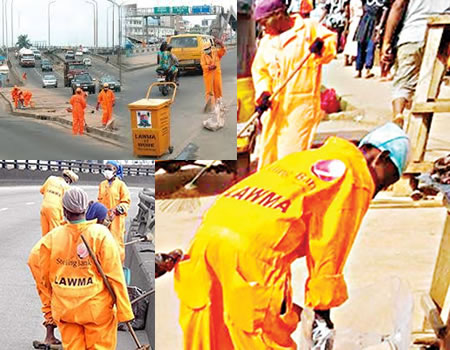
Last week, about 500 street sweepers under the Cleaner Lagos Initiative (CLI) of the Lagos State government protested against delayed salaries and their merger with the Lagos State Waste Management Authority (LAWMA). The protesters urged Governor Akinwumi Ambode to address their suffering and expressed the desire for a reversion of their status to what it was before their transfer to LAWMA in August. The sweepers also complained of lack of tools to work with and poor condition of service, including the absence of health insurance, pension and other perquisites that would have made their job more rewarding.
Without prejudice to the condition under which the workers were hired, it is inappropriate to subject any worker to the experiences complained about. The conditions are patently against labour law. While it may not be the place of the workers to choose which government agencies they want to work for, it is not out of place to look into the reasons they want the government to demerge them from LAWMA. Even if the official attention to be accorded them is limited to addressing the reasons for their disaffection with LAWMA, it will go a long way in assuaging their feelings. Indeed, the workers’ protest may be what the state government actually needs to reappraise LAWMA, especially in the area of the welfare of workers in its employ.
Further, all other items of complaint such as delayed salaries, lack of working tools and absence of health insurance should be promptly addressed: they are legitimate rights of the workers. Given the nature of the task of the sweepers which necessarily demands close proximity with dirt, filth and, by implication, diseases, it is inconceivable that their employer allegedly did not make provision for health insurance for them. Their risk of getting sick is much higher than that of workers who are otherwise engaged. In fact, health insurance for the workers should also include accident insurance. This is because sweeping the highways in a clime where there is a preponderance of reckless and undisciplined motorists can be quite hazardous.
It is on record that some sweepers met their untimely deaths because of the carelessness of hit and run drivers and as such, insurance policy as a fallback position is essential. Again, the sweepers are allegedly paid peanuts, an indication that the Lagos State government, like any typical capitalist organisation, latched onto the unemployment situation in the country to underpay the few persons employed. That is wrong because government’s motives should always transcend economic considerations to include social issues. And as if it was not bad enough that pittances were being paid as salaries, the workers complained that they were always owed one month arrears of salaries. This should not be the case.
It may appear somewhat strange that the workers were complaining because their employer owed them one month’s salary in a country where the payment of workers’ salaries in full and on a regular basis by many sub-national governments has become the exception rather than the norm. However, Lagos State does not have a history of owing its workers. And in the unlikely event that the state actually found itself in a situation where salaries of workers had to be owed or delayed, compassion and some modicum of sensitivity should have demanded that the most vulnerable group comprising the lowest paid was not affected. It would be an unpleasant surprise if the workers were actually owed salaries because of paucity of funds rather than administrative lapses on the part of the agency they work for.
Lately, there have been apparent lapses in the administration of waste management and disposal in Lagos State. It even took a very serious political dimension and, among other factors, it exacted a great political price from the Chief Executive Officer of the state. In an industrial city state with an estimated population density of about 2578 persons per square kilometre compared to Kano State that is similarly populated but has a population density of 441 persons per square kilometre, waste management and disposal is bound to be a critical governance issue. And to the credit of Lagos State, it has always shown more than a passing interest in environmental issues but somehow, recent strategies, whether they were inadequate or sabotaged, did not work.
It is not clear whether the complaints and protest by the street sweepers is a spin-off from this seeming environmental policy failure, but it will be helpful to look into their case and resolve it. The sweepers should not be allowed to go on strike, otherwise there will be severe consequences. The poor handling of waste management and disposal has already caused enough damage to the image of the state and the ambitions of its managers. Any further drift into the precipice should therefore be studiously avoided.
Tribune
END

Be the first to comment